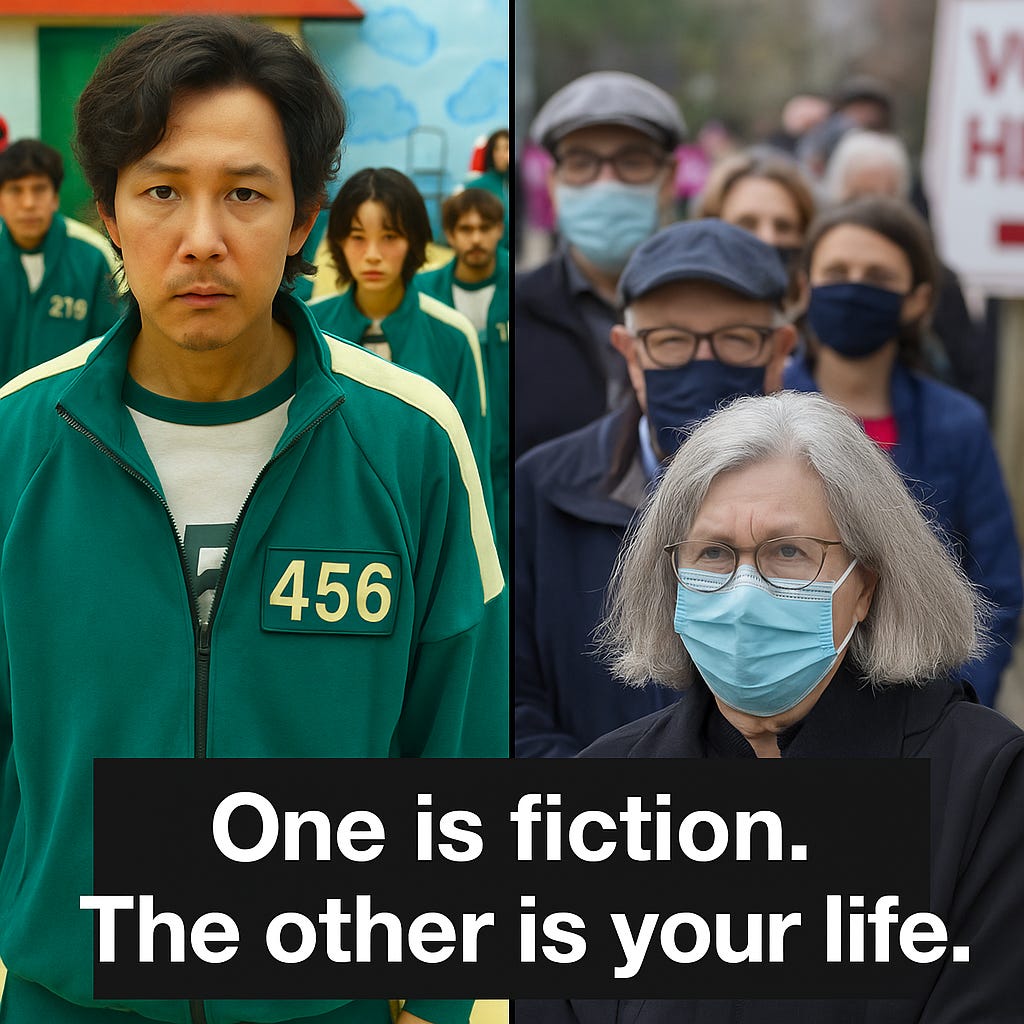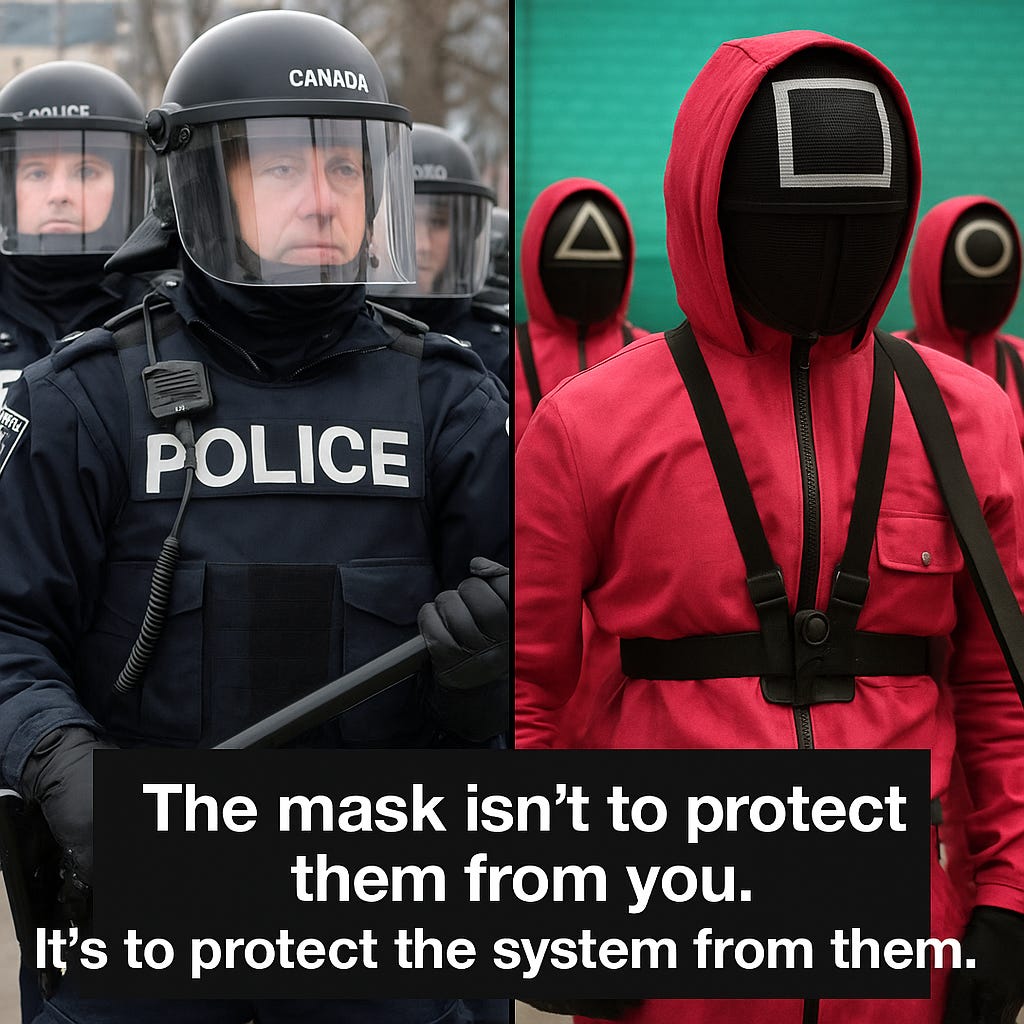In 2021, Netflix released a South Korean series that quickly became a global phenomenon: Squid Game. At first glance, it looked like a dystopian thriller - 456 contestants competing in a series of childhood games for a massive cash prize. But the twist? Losing any game meant death.
The players weren’t criminals. They were ordinary people crushed by debt, bad luck, and systemic failure. Most had been chewed up by the economy, betrayed by family, or abandoned by the very institutions meant to protect them. They were desperate. And desperation makes people compliant. So when strangers in suits offered them one last chance to escape their misery, they signed away their dignity - voluntarily.
"What made Squid Game so haunting wasn’t the violence. It was the reflection in the mirror."
Part II: The Guards — Enforcers of Compliance
In Squid Game, the guards in red jumpsuits are the most visible part of the machine. They carry out punishments, enforce the rules, and silence dissent. But they don’t make the rules. They don’t question them. Their faces are hidden. Their voices are almost never heard. They are order without thought. Enforcement without conscience.
"If a guard reveals his face to a player, he is executed. A guard with a face becomes a human being."
There’s even a rule in the game: if a guard reveals his face to a player, he is executed on the spot. No exceptions.
Why? Because a guard with a face becomes a person. And people might feel guilt, empathy—or rebellion.
Dehumanization is required for the game to function.
In the real world, the guards wear badges, suits, uniforms—or sometimes lab coats. They work in police departments, revenue agencies, ministries of health, or corporate compliance offices. Some patrol streets. Others monitor your bank account. Some carry guns. Others carry clipboards—or keyboard access to your digital life.
They say they’re just doing their job.
During the pandemic, these modern guards enforced lockdowns, arrested pastors, blocked families from burying their dead, shut down small businesses, and froze the bank accounts of protesters. The orders came from above, but it was ordinary men and women who enforced them.
And just like in Squid Game, many of them believed they were helping.
This is the tragedy of the guard: most don’t realize what they’ve become until it’s too late. They believe they’re defending society—when in fact, they’re defending the system that’s hurting it.
And when they finally do show their face—when they step out of line, express concern, or question orders—they are discarded. Silenced. Demoted. Fired. The system doesn't just punish the players. It punishes the guards who remember they're human.
Part III: The VIPs — The Hidden Hands Behind the Curtain
You don’t see the VIPs until the end of Squid Game. Draped in gold masks and lounging in decadent surroundings, they watch the games with amusement. They place bets on who will die next. They view the suffering of others as a spectacle—a source of entertainment and profit.
They are the ones funding it all. And they are completely detached from consequence.
"The real VIPs don’t care who wins elections—only that the game continues."
In our society, the VIPs are not fictional. They’re very real—and far more protected.
They don’t appear on ballots. They don’t give press conferences. They sit on the boards of global institutions. They run central banks, multinational corporations, transnational organizations, legacy media conglomerates, and intelligence partnerships.
The Prime Minister? The President? They’re just the Front Man. The public-facing manager of a game whose rules were written long ago.
The CRA and IRS? They act like economic guards. Not just collecting taxes, but creating the conditions for economic control. Work harder? They’ll take more. Save for your family? They’ll penalize your estate. Disagree with their politics? They might audit you into silence.
The illusion of choice is maintained through elections, but no matter who you vote for, the tax code stays. The surveillance grows. The bureaucracy deepens. And the real decision-makers remain untouched.
Part IV: The Exit — The Way Out Isn’t Political
In Squid Game, there’s one final tragedy: the players could leave. The game had a rule. If the majority voted to end it, they could all walk away.
They did.
And then… they came back.
Why? Because even though the game was deadly, the world outside felt worse. They were drowning in debt, shame, and hopelessness. In a sick twist, the game felt like their only hope.
We see the same dynamic today.
People know the system is broken. They know their government doesn’t represent them. They know the institutions they once trusted are now used against them. But they keep going back to the same ballot box, choosing between different colours of the same boot pressing down on their lives.
"You don’t escape the game by playing better. You escape by refusing to play."
The real exit isn’t political. It’s personal.
You leave the game when you stop believing the system will fix itself.
You leave when you:
Get out of debt and build financial independence
Speak truth without fear of cancellation
Build your own food security, energy resilience, and income stream
Remove your children from systems that train obedience instead of wisdom
Create community with others who refuse to play
This is the parallel economy. The parallel society. The real resistance.
The system doesn’t survive because it’s powerful.
It survives because you participate.
"The most radical act in a rigged game is to walk away—and build your own."
Want to help others wake up and walk away?
🡒 Share this article.
🡒 Leave a comment.
🡒 Start the conversation in your community.
Because the longer we keep playing, the more powerful the game becomes.






Good suggestions for creating the real resistance. I don't know what nation Bruce Cockburn was thinking of when he sang "They Call It Democracy", but Canada has become (along with a host of 'Western' nations) a form of inverted totalitarianism. The form of democracy exists (e.g. elections) but then as Blacklock's Reporter writes, 121K votes go uncounted and Elections Canada shrugs (see: https://www.blacklocks.ca/121k-ballots-went-uncounted/). As commentator Bruce Pardy has remarked, "the managerial state" is here to stay. Unless enough of us find a way to opt out and form an alternate society.
The great Jon Rappaport calls these people (assuming they are human) ‘the spiritually dead’, in that they have no soul, no empathy, devoid of anything decent. That’s our political class, our central bankers, and the oligarchy that controls the politicians, who in turn deem it necessary to make our life more unliveable, more expensive, more crap. Carnage is a continuation of the same☘️